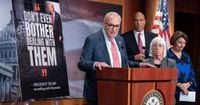As the clock ticks down to midnight on Wednesday, October 1, 2025, Washington is bracing for what could become one of the most consequential government shutdowns in recent memory. Despite weeks of heated negotiations, finger-pointing, and mounting public anxiety, lawmakers remain deadlocked over the federal budget, with the fate of millions of Americans—and the credibility of both political parties—hanging in the balance.
The standoff, as reported by The Associated Press, centers on a familiar yet increasingly fraught set of issues: health care, government spending, and the use of political brinkmanship as a tool for leverage. Senate Democrats, having struggled for months to counter President Donald Trump’s agenda, are now threatening to let the government shut down if they do not secure significant concessions on health care, particularly the extension of Affordable Care Act (ACA) subsidies and the reversal of $1 trillion in Medicaid cuts enacted by Trump’s so-called “One Big Beautiful Bill Act.”
“America’s ability to endure this moment requires a Democratic Party driving a vibrant, impactful and public resistance,” wrote Katie Bethell, executive director of grassroots group MoveOn, in a letter to party leaders. The sentiment reflects a groundswell of frustration among Democratic voters and activists, who have grown increasingly disillusioned with what they perceive as their party’s reluctance to fight back against Republican dominance in Washington.
Yet the Democrats’ endgame remains uncertain. If no agreement is reached, the White House has signaled plans to begin laying off hundreds or even thousands of federal workers—a move that would echo the nation’s last shutdown in 2018-2019, when a 35-day impasse over border wall funding left government employees without pay and disrupted services nationwide. The Trump administration has not yet released detailed guidance on which government functions would be deemed essential, leaving many Americans and federal workers in a state of anxious limbo.
President Trump, for his part, has made no secret of where he places the blame. Just four days before the funding deadline, he dismissed concerns about the potential shutdown, telling reporters before departing for a golf tournament in New York, “If it has to shut down, it’ll have to shut down. But they’re the ones that are shutting down the government.” According to HuffPost, Trump doubled down on his criticism of Democratic priorities, calling them “crazy” and specifically deriding their positions on civil rights and health care. “They want to have transgender for everybody,” he said, in a statement that quickly ricocheted around Washington.
The president’s decision to skip a scheduled meeting with Senate Minority Leader Chuck Schumer and House Minority Leader Hakeem Jeffries only fueled Democratic outrage. “Donald Trump is at a golf event,” Jeffries said at a press conference. “He didn’t have the time to meet with Democratic leaders to fund the government and address the Republican health care crisis.” Schumer echoed this frustration on PBS’ “News Hour,” stating, “This president is just—not up to being president if he can’t sit down and negotiate with the two Democratic leaders.”
At the heart of the impasse is the Senate’s 60-vote threshold for passing funding measures. Republicans, despite controlling both the House and the presidency, need at least seven Democrats to support any bill in the upper chamber due to the filibuster. So far, Democrats have held firm, rejecting a GOP-backed stopgap proposal that would have funded the government through late November without addressing ACA subsidies. According to Vox, the expiration of these subsidies at year’s end could cause health care premiums for some Americans to soar by as much as 75%—a scenario Democrats argue would deepen the ongoing health care crisis.
Republican leaders, however, see things differently. Senate Majority Leader John Thune has refused to negotiate with Democrats unless they agree to a seven-week extension of current funding levels, a measure that passed the House but failed in the Senate. “They’re trying to use what they think is leverage to get a bunch of stuff done,” Thune told Fox News. “It’s never going to happen.” House Speaker Mike Johnson has also dug in, stating the House will not return to session until the day after the funding deadline—effectively guaranteeing that any last-minute compromise will be impossible to implement in time.
The policy dispute extends beyond mere numbers. Democrats insist that the fight is about more than budget math; it’s about protecting vulnerable Americans from steep health care costs and restoring funding to programs gutted by Trump’s legislative agenda. “I’m not afraid of [Trump], I’m not afraid of his threats, and I know that this is going to be a tough fight and an ugly fight,” said Senator Cory Booker, D-N.J. “But this is one fight worth having, and that’s where I stand.” Senator Amy Klobuchar added that Democrats are open to discussions but “need more than Donald Trump’s vague promises.”
Some Republicans, including Senator Lisa Murkowski, have floated a possible two-year extension of ACA subsidies with certain restrictions, but Trump has rejected any compromise, accusing Democrats of pursuing an “all or nothing” strategy. The president’s Office of Management and Budget recently annulled billions of dollars in previously allocated spending, further eroding trust and heightening the risk of a prolonged shutdown. Budget experts cited by HuffPost warn that the administration is laying the groundwork for permanent layoffs, a prospect that has government employees anxiously awaiting pink slips and families who rely on federal services preparing for delays.
The political calculus on both sides is fraught with risk. Democrats are betting that public opinion will ultimately blame Trump and Republicans for any shutdown, especially given the administration’s high-profile actions and the president’s visible absence from negotiations. But history suggests that blame for government closures is often shared, and the fallout can be unpredictable. As Senate Majority Leader Thune put it, “Funding the government is a Democrat equity, at least it always has been. And here they are steering us off that cliff.”
For Democrats, the stakes are especially high. Having faced backlash from their base for helping the GOP prevent a shutdown in March, party leaders know that yielding again could further erode trust and enthusiasm among their supporters. “It would be naive to suggest that all the trust that Democratic elected officials have lost and squandered with their base voters can be regained in one moment or one fight,” said Joel Payne, chief of communications for MoveOn. “But I think it will go a long way to really start to reverse that relationship.”
As the hours dwindle, the sense of uncertainty in Washington is palpable. With both sides digging in and no negotiations scheduled, the prospect of a shutdown looms large. Government workers, families, and businesses across the country are left wondering what services will be available, who will be affected, and how long the standoff will last. If recent history is any guide, this high-stakes game of political chicken could go down to the wire—or beyond.
Whatever happens next, the outcome will shape not just the immediate fate of the government, but the broader trajectory of American politics in the months and years ahead.





